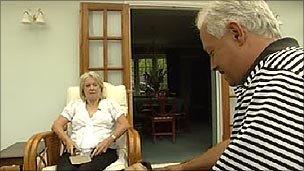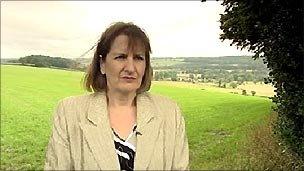High speed rail compensation scheme begins
- Published
The compensation scheme for people affected by the proposed High Speed Rail link between London and Birmingham is due to be launched.
High Speed 2 is destined to cut journey times between London and Birmingham to just 45 minutes.
Anyone who urgently needs to sell their property but cannot because of the proposed line will be able to apply for the government to buy their home.
An independent panel is being set up which will look at applications on a case-by-case basis.
But there are fears the criteria may be too strict, and that some may miss out.
The proposed route for a high speed rail link between London and Birmingham was announced in March.
People found out if their homes would be bulldozed or whether there'd be a train running at more than 200 miles-per-hour (mph) at the bottom of their garden.
Home issues
The route would go from London's Euston Station, run just south of Aylesbury, between Coventry and Kenilworth, and then into a new station in the Eastside area of Birmingham.
The track would be designed to carry trains at up to 250mph, cutting the London to Birmingham journey time to 49 minutes - that's around half an hour less than at present.

The Halls hope they will be eligible for the scheme
Trains will be up to 400 metres long, and carry up to 1100 people. Initially there would be up to 14 trains an hour.
But to do that, some people will have to lose their homes and businesses.
The Exceptional Hardship Scheme is aimed at people who live on, or very near this proposed route. But it's not for everyone.
The current route is only a proposal and was announced by the previous government.
After consultation the new government might decide it wants to use a different route.
So those homes which look at the moment as if they're blighted by the project, might end up being completely unaffected.
So today's scheme will only compensate those home-owners who need to sell now, not everyone who might be affected eventually.
To be eligible for compensation, people need to demonstrate that need - for example if they're getting divorced or have to move somewhere else for a new job.
They also have to have made "reasonable efforts" to sell their property already - this means having it up for sale for at least three months, with no offers over 85% of the pre-high speed rail market price.
An independent panel assesses their application, then recommends whether the government should buy the property for the full market value.
Bill and Carolyn Hall are hoping the panel will back their case. Carolyn has multiple sclerosis and they need to sell their home to pay for her care.
But after four months on the market they've had no offers.
"I suppose the acid test is that I wouldn't buy it," Bill says.
"If it was me coming to have a look and I found out that there was going to be a rail link within 400m I think my interest would cool pretty rapidly."
'Close vicinity'
But there's a danger that the Halls will not qualify for compensation.
"Only those people who are really near to the line, who are in the close vicinity of the line, are going to get compensation," says Hilary Wharf, a director of the HS2 Action Alliance, which is opposing the line.

Hilary Wharf says there will be noise issues with the new line
"Those who are just that bit further away are going to be severely affected. They're going to be affected by the noise, they're going to be affected by the building of it, and yet they will not get compensation."
The government though says it has not set any distance parameters, and that it's for the independent panel to decide who gets compensation.
It also refutes claims that there is not enough money in the pot to pay for everyone, arguing that the £50m earmarked for the scheme is an estimate - not a budget or cap.
It says anyone who qualifies for compensation will get it.
'Devastated'
Of course many people don't want to sell at all.
Carolyn Hall visits the nearby Weights and Measures gym for help with her MS.
That's run by Caroline Owen-Thomas, who's spent 18 years building up the business. But the proposed high speed line runs straight through the middle of her property.

Caroline Owen-Thomas has spent 18 years building up her business
Because Caroline doesn't need - or want - to sell, she won't be eligible for the compensation fund.
She'll have to wait until the route is finally decided - likely to be late 2011 - and if it remains unchanged she will have her property compulsorily purchased by the government.
Caroline found out the news when one of her customers rang to tell her.
"I was completely devastated because all I could think of was this is my home, this is my business," she says.
"I've put blood, sweat and tears into this, what will I do?," she adds.
"How can they just demolish someone's property? What am I going to do in the future? I don't want to be anywhere else, this is where I want to be."
The government says it is going to look at the statutory compensation arrangements, and may improve them to make sure people like Caroline are compensated properly.
'Challenge'
But there are no easy answers here.

Philip Hammond: "Least possible damage for the maximum possible benefit"
"Government is all about taking difficult decisions," says Transport Secretary Philip Hammond.
"It's about balancing the benefits to the nation as a whole, to the economy, with the burdens that individuals and communities will suffer.
"And the challenge is to get the route which causes the least possible damage for the maximum possible benefit.
"Now that can never mean that nobody suffers. Our job is to make sure that we fairly compensate those who are disadvantaged by the decisions taken."
- Published17 August 2010